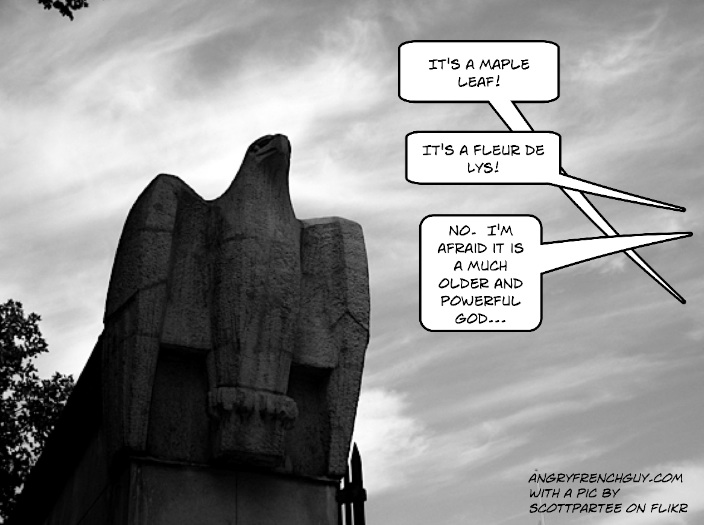A Beautiful Mindfuck

I’ve spent the last few weeks looking for a book. A book and movie, actually. I’ve been trying my neighborhood libraries, bookstores, the National Library, without any luck, even though the package came out in December 2007. In the end I had to drive to the Mile End, to an industrial side street, right to the distributors office where I bought the thing with cash.
The movie is called Un sur 1000 and the book Post-Scriptum. It is about and by René-Daniel Dubois.
René-Daniel Dubois is an actor, playwright and writer who got into serious trouble for calling the 1995 referendum on Québec independence a failed suicide attempt in French daily Le Monde. He quickly found out that talking against the family abroad is a big no-no in Québec.
Unsettled by the violent reaction to what was only one intellectual’s personal opinion, he set off on a quest to seek the roots of Québec nationalism. He came to the conclusion that Québec society was what he called « the first successful fascist society – that is to say where not only is there no form of resistance, but where the very idea of resistance doesn’t even seem to be conceivable. » In a filmed lecture that accompanies the movie he demonstrates how, in his opinion, this society has, at it’s root, the ultramontane French clergy and their opposition to democracy, individuality and, finally, the act of thinking in general.
« No, nationalism does not, not at all, have for objective the preservation of a popular culture–or of a language–, or the welfare of citizens of a given society–those are only pretexts.
Nationalism is not an ideology, it’s a rhetoric: it is not a cookie, but a way of selling it – changing the packaging does not affect it in any way. Nationalism, it’s a way of maintaining one and only one vision of what life in common could be: the one in which, by means of the notion of permanent menace, the population is summoned to obey elites who, because of the gravity of the situation as they describe it themselves since they are the only ones allowed to talk, don’t have to seriously answer to anyone. »
In all fairness Télé-Québec aired the movie once. La Presse and, incredibly, the weekly Suburban (google English), published excerpts (google English) – in French ! – and Dubois was recently invited to Tout le Monde en Parle, a major talk show, again on Radio-Canada.
Most of the above media are considered by Québec nationalists as propaganda organs of the vast Canadian conspiracy to destroy Québec specificity so it only strengthened their conviction that Dubois was a federalist agent earning a comfortable Canada Council of the Arts job with some timely Québec-bashing.
« You’re so vain you think this song is about you…. »
Québec’s nationalists are so narrow-minded that they took it personally, but Dubois was talking about a much broader phenomena. Let’s read the passage I quoted again:
« Nationalism is not an ideology, it’s a rhetoric: it is not a cookie, but a way of selling it – changing the packaging does not affect it in any way. Nationalism, it’s a way of maintaining one and only one vision of what life in common could be: the one in which, by means of the notion of permanent menace, the population is summoned to obey elites who, because of the gravity of the situation as they describe it themselves since they are the only ones allowed to talk, don’t have to seriously answer to anyone. »
The outer menace is Americanization, the inner menace is… Québec’s separatists. The situation is so fragile that any questioning of bilingualism, the senate, the division of power between provinces and the federal government could lead to the break-up of the greatest country on earth!
If nationalist had bothered to read the book before condemning it they would have come so hard they would’ve ejaculated blood reading how Dubois tears apart their arch-enemy Pierre-Elliot Trudeau.
Early in the book Dubois remembers how in the days of the Great Darkness Québec free thinkers used to flee to Ottawa – the university and the federal institutions – where they felt they had more wiggle room to think.
« In the middle of the XIXth century, the ultramontane clergy – the catholic equivalent of the Talibans – seize total power inside Québec society, letting the few remaining real democrats to play by themselves in Ottawa. They can run, anyway, one day or the other they will be caught up with and the score settled. »
The score was settled, according to Dubois, when the Jesuit-educated Trudeau and his suite take over the Liberal party and Ottawa in the 1960’s. Proof? His decision to suspend civil liberties and send the army in the streets of Montreal in October 1970. « How do call what I’ve just described? A fascist coup. »
René-Daniel Dubois conclusion that the Quiet Revolution was a sham because television in Québec sucks and and the Cultural Affairs Ministry doesn’t properly fund Artistes like him is not entirely convincing. His demonstration that Pierre-Elliot Trudeau and FLQ terrorists really belonged to the same nationalist elite is, to say the least, very sketchy.
But, the way in which nationalists in Québec immediately rejected Dubois’s work as federalist propaganda and, inversely, the way the federalists, oblivious to the fact his book depicted their messiah as the ultimate incarnation of Québec fascist nationalism, used it as an argument against the separatists…
What could be more convincing proof that Québec is a society where people don’t think!
Don’t think, don’t read, don’t know shit!
The reaction to his book on all sides vividly demonstrates his thesis that Québec is a society where thinking is not only discouraged, but where it simply doesn’t happen!
Feels like we are going to have to keep looking for his books in back alleys for a while….